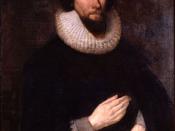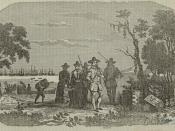John Winthrop's "City Upon A Hill", described the mission and vision to start a "New England", which became known as the United States of America. John Winthrop believed a perfect society could exist in a perfect city where everyone worshiped and worked together in harmony. He envisioned a community so closely woven together that everyone was equally important to the future of the city. A city where a purer form of Christianity would exist, which would provide a moral and religious show for the rest of the world to see. Quoting the New Testament, (Matthew 5:14) John Winthrop warned the people they would be totally exposed for the entire world to see, as a "city upon a hill."
Not everyone agreed with John Winthrop's vision. Thomas Jefferson, for example, did not have the same view as Winthrop. Jefferson looked at Winthrop's views as radically idealistic and knew he was up against enormous odds.
Thomas Jefferson and John Winthrop came from very different backgrounds. Jefferson was considered to be a Deist and believed "God created the world, but pretty much left it up to man to create the world he lives in." (Mayhall, 2005) Jefferson viewed cities to be evil and full of greed. Thomas Jefferson felt that cities were breeding grounds for plagues and diseases and would likely cause epidemics.
Winthrop encouraged others that "this land was to be a model society of Christian love meaning they should care for each other as they cared for themselves and, more specifically, there should be no poor among them." (Holland, 2002) It was surprising to learn that Winthrop felt the natives had not made good use of their land on which they lived, and as long as the Puritans gave those that remained "sufficient for their use" they felt they...


